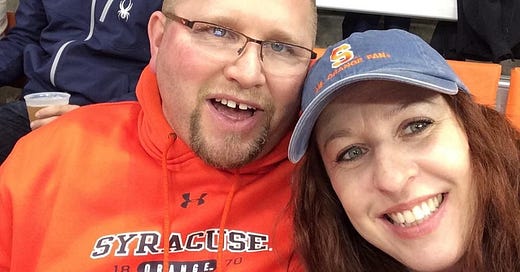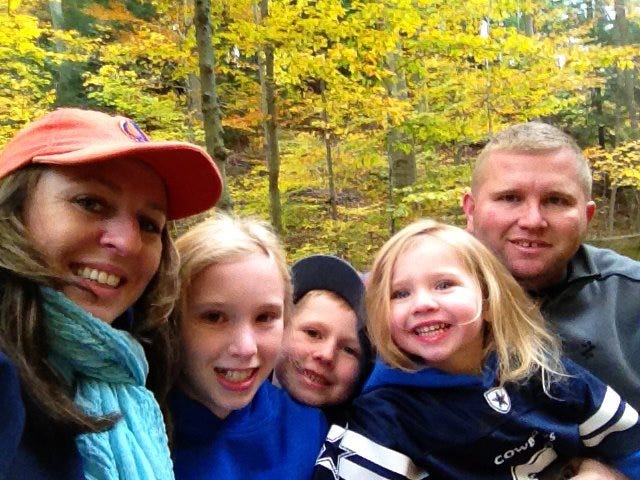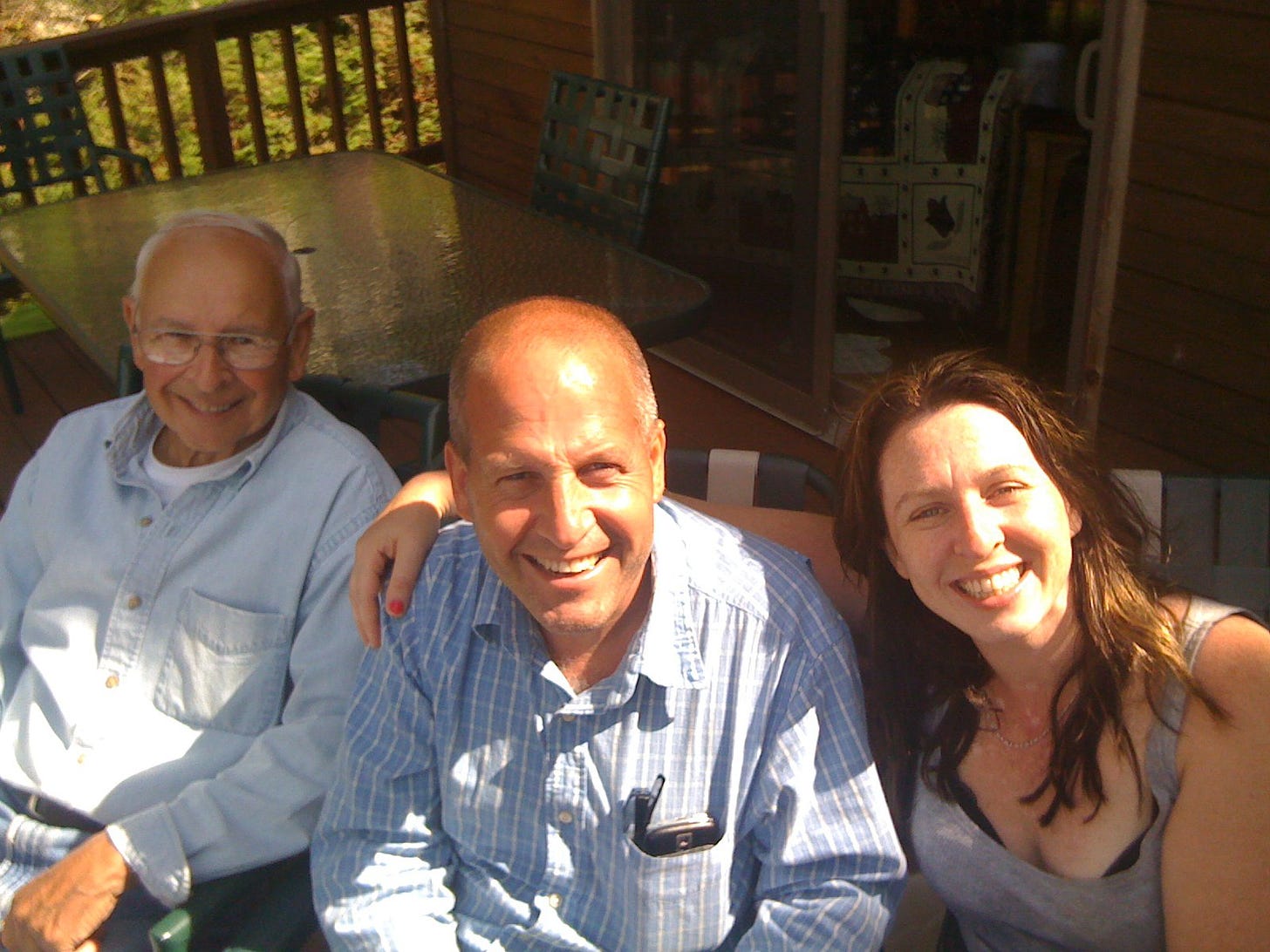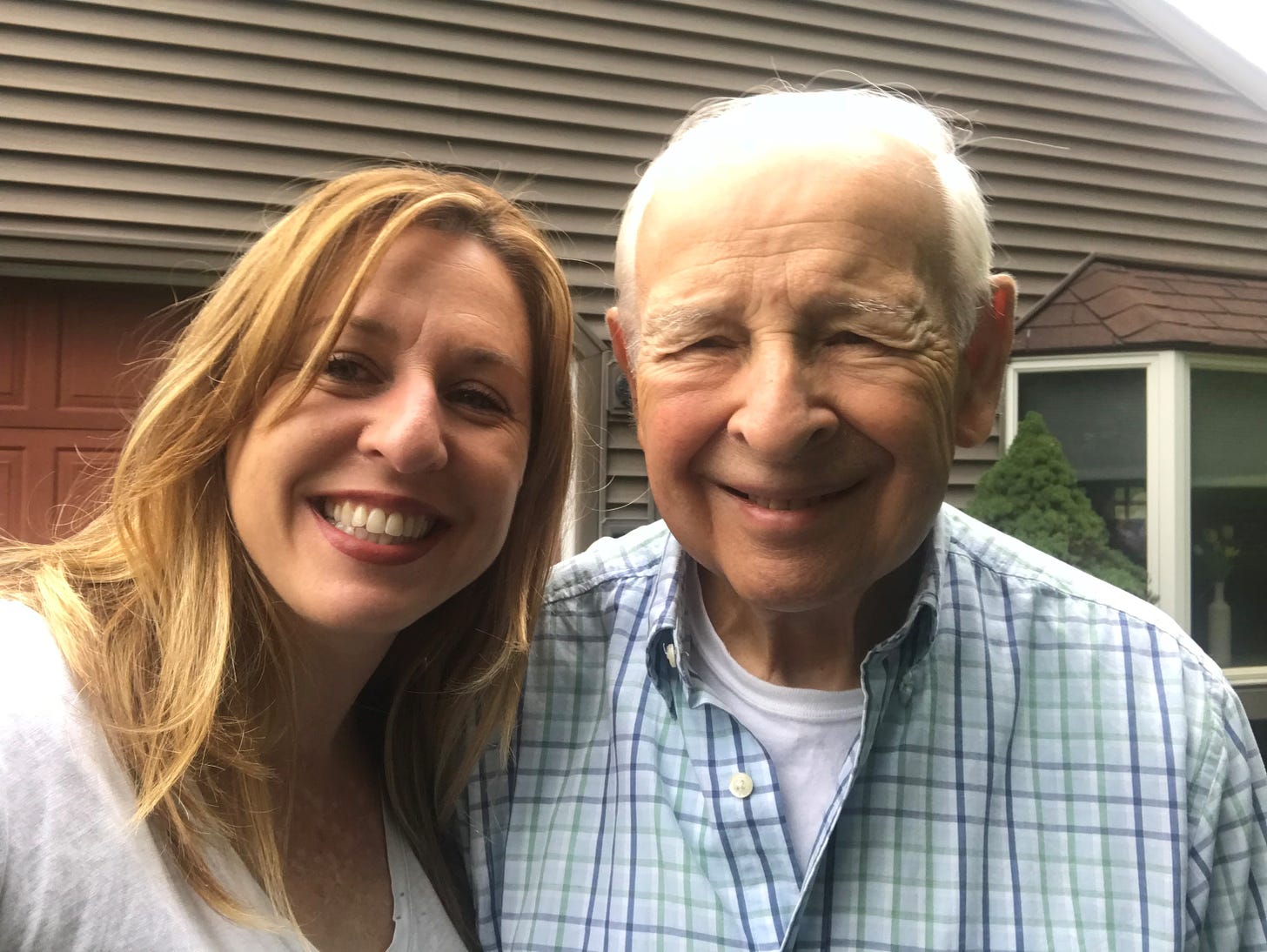GREIVER'S DIGEST Vol. 3: Sue Leahey-Litera
"It’s watching the loss of a person as you know them, yet they are still here. It’s losing what you know they can become and what you envision them becoming."
Ed. Note: The community of people experiencing grief is vast and wide. Many of you have reached out to say that you relate to the topics discussed here and I want to tap into your stories to broaden this community of grievers.
Maybe you’re grieving a sibling or a pet, or a parent or spouse. Maybe you’re grieving your past or a future that will never come to be. Your feelings are valid.
If you’re interested in participating in a Griever’s Digest Q&A or submitting your own original work, email me at jaredpaventi at gmail.com. This is a community space and the more people share, the more everyone will relate.
It’s hard, but I promise you won’t regret it.
Griever’s Digest: Sue Leahey-Litera
Sue Leahey-Litera and I worked together years ago when she was a fundraising consultant for my team at the Alzheimer’s Association. We lost touch, as often happens, but reconnected recently through LinkedIn.
In 2015, Sue’s husband died from brain cancer. He was diagnosed and gone within 10 days. Her blog, Not Just A Widow, was where she journaled her grief and emotions in the wake of his passing. There are only a few entries, but they are intense and moving.
Sue has since remarried, blending her family with her second husband’s. I invited her to do a Griever’s Digest and she agreed, submitting the following essay.
I was asked to write about grief which is a subject I feel like I know all too well. Or, shall I say grief in the traditional sense, meaning the death of a person close to you. Yet, today as I sit here typing, I am deeply in the throws of a crisis that feels so similar to grief.
Although this has been a crisis over the last four years, I am just now realizing what I am feeling is also grief. It’s the same gut-wrenching pain from having someone I love and very close in my life in a mental health and substance abuse crisis. To protect their privacy I won’t reveal in what capacity they’re in my life, but I am in a position to be the person to make decisions for them.
What started as a mental health concern birthed a substance abuse issue with a myriad of emotional disturbances, dysregulation, and impulsivity control. I decided this was what made sense to write about because I know all too well the mental health crisis in our country, and I believe globally.
And it feels like grief, kicking you in the stomach and running you over like a bus with soul-crushing grief.
Grief is very personal and unique, but pain isn’t.
I know this because I also have experienced grief in the last decade. Eight years ago, at the young age of 42, my husband passed away after a 10-day illness, giving me and my three children no time to prepare for his loss. I now refer to those first several months as the “fog phase,” as I was functioning only with the help of a great support system. His loss was profound.
Epic.
Devastating.
And I distinctly remember thinking that I could not imagine I would ever again in my lifetime experience such a level of pain. Watching my kids grieve and not being able to fix it, dealing with my grief, and just imagining a life that was now so new and not what I had planned. How could anything ever feel worse than that?
Six months later, my brother passed away after a long illness that robbed him of his ability to communicate. My sister-in-law, a steady force, stood by him for seven long years, and loved and cared for him. I imagine she also thought no pain could be worse.
Two years after that, we lost my dad to dementia after several years of watching him deteriorate and slip away. Watching my mom endure his loss brought it all back for me, but I thought how can she move forward after being with him for three times as long as I was with my husband?
Having experienced grief when it was “expected,” as in the case of my brother, from someone older as in the case of my father, and someone unexpected and young as in the case of my husband, I can say no one scenario is better than the other. What my mom, sister-in-law, and I experienced were all so painful in different yet very similar ways.
Grief is very personal and unique, but pain isn’t.
That’s what brings me back to my present day. What I am experiencing with my loved one right now is very similar to grief. It’s watching the loss of a person as you know them, yet they are still here. It’s losing what you know they can become and what you envision them becoming. The pain of that is very relatable. Mental health disorders are still complex, and widely misunderstood, underfunded and stigmatized. Mental health disorders leading to substance abuse, while very common, are also widely misunderstood, and often criticized and judged.
It’s watching the loss of a person as you know them, yet they are still here. It’s losing what you know they can become and what you envision them becoming.
Knowing that much of what people in this space are experiencing is beyond their control doesn’t make it less infuriating, terrifying and angry to the person caring for them. Even when we shouldn’t be angry, it’s nearly impossible to negate that feeling. Then the guilt washes over the anger.
And that cycle is grief.
The impossible-to-control feeling comes in waves, sucking the breath from your lungs, speeding your heart to a racing pace. It’s unpredictable and unstoppable. You are watching them slip into someone you don’t recognize and you wait. You wait for the next catastrophic event, the next phone call, and for the sky to fall. Because life has shown that it can and it has.
I know I’m not alone in this space, but it feels isolating. I hope that anyone else who is living in this space can take solace in now knowing they are not alone. Maybe if we all started talking more openly, we could create a space for normalizing this world of mental health disorders and give some peace to everyone affected by it.
Let’s talk about it. Let’s be open and transparent, because in the end, the pain is the one invisible string that connects us all.
Ed. Note: Sue’s essay was edited lightly for grammar and clarity
Join the Griever’s Digest Family
Grief is hard, complex, and not easily defined. It doesn’t just apply to the death of a living thing, but it is the pain of watching someone in crisis. Expressing your grief is an important part of healing and living with your feelings. I want to offer this space as a forum for you, whether its the Q&A or your own original work…both are fine as long as it is authentic and in your words. Drop me a line at jaredpaventi at gmail dot com if you’re interested.
Final thoughts on finality…
“It's been six months since she died. But Ove still inspects the whole house twice a day to feel the radiators and check that she hasn't sneakily turned up the heating.”
— Fredrik Backman, A Man Called Ove
Dirt Nap is the Substack newsletter about death, grief and dying that is written and edited by Jared Paventi. It’s published every Friday morning.
We are always looking for contributors and story ideas. Drop us a line if you have interested in either space at jaredpaventi at gmail dot com.
I’m all over social media if you want to chat. Find me on Facebook, Twitter/X and Bluesky. I’m on Threads and Mastadon at @jaredpaventi, but I don’t check either regularly. You could message me on Instagram or LinkedIn, but I’m highly unlikely to respond.
Dirt Nap is free and we simply ask that you subscribe and/or share with others. The ego boost of inflated readership stats is all we need to get by.
If you or someone you know is in crisis, call or text 988 to reach the Suicide and Crisis Lifeline or chat live at 988lifeline.org. For additional mental health resources, visit our list.












I really enjoyed this, keep up the great work!